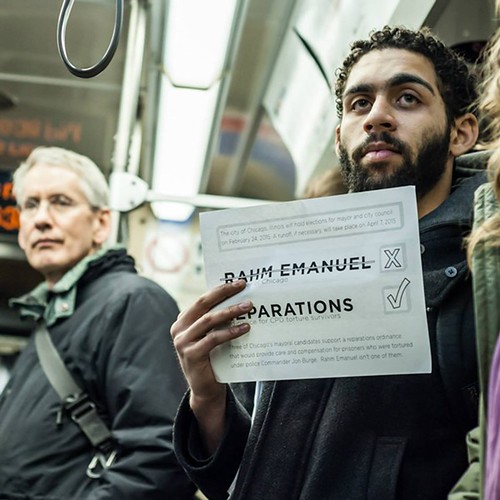
[Last year the Chicago Reader launched a weekly transportation column written by Streetsblog Chicago editor John Greenfield. We syndicate a portion of the column on Streetsblog after it comes out online; you can read the remainder on the Reader’s website or in print.]
When it comes to improving Chicago transportation, city officials and advocates often focus on infrastructure, reasoning that street redesigns, public transit improvements, and better pedestrian and bike facilities will help make travel safer and more convenient for all residents.
But decision makers sometimes overlook issues that are specific to Chicago's lower-income communities of color on the south and west sides. Many of these areas have poor mass transit service, unsafe conditions for walking, and limited or no access to bikeways and Divvy stations. Transportation costs that may seem trivial to higher-income residents, like the price of a CTA ride or a traffic ticket, can be significant for poor and working-class people. And street crime and police harassment—problems that disproportionately affect African-American and Latino Chicagoans—can be major factors in their travel decisions.
To get some perspective on these topics, I spoke with two leaders associated with Chicago's Black Lives Matter movement: Charlene Carruthers, national director of Black Youth Project 100, and Jason Ware, an organizer with the #LetUsBreathe Collective. (We'll hear from Latino activists in a future column.)
Carruthers, 31, was born and raised on the south side and currently lives in Bronzeville. Her organization, made up of African-Americans ages 18 to 35, addresses issues like police abuse, mass incarceration, and LGBT and women's rights "using a Black queer feminist lens."
Ware, 21, grew up in Rochester, New York, and now lives in the Austin neighborhood, where he runs a restorative justice program at Austin College and Career Academy. #LetUsBreathe was formed as a fund-raising initiative to provide aid to Ferguson protesters. The group uses civil disobedience, as well as outreach through various art forms, to call for police and prison abolition.
"I do believe transportation access is an element of social justice," Carruthers says.

For starters, as noted in this column in the past, large segments of the south and west sides lack good access to the el system. That directly affects some of her group's members, who have to make multiple CTA transfers to access downtown meetings.
"Meanwhile, we know that public transportation is often concentrated in areas where economically advantaged people live," she says. "That makes it harder for low-income people to access jobs, school, and activities."
Limited CTA service hours can also be a problem in underserved communities, notes Ware. "While the Red and Blue Lines run 24 hours, the Green Line, and especially the Pink Line, stop running very early," he says. "That makes it hard for people in Little Village and North Lawndale to get places at night."
Being forced to wait for transit for long stretches, or encountering bus stops with no seating become "questions of dignity" for African-Americans, Carruthers says.
Both activists also highlighted public transit problems specific to African-American teens. Chicago Public Schools students, around 38 percent of whom are black, are issued reduced-fare cards that get them on CTA buses and trains for $0.75 (plus $0.15 for transfers). Ware and Carruthers say they've witnessed and/or heard about incidents in which black teens who didn't have a reduced-fare card or student ID with them were barred from taking advantage of the discount, even though some of these students were wearing school uniforms at the time.
In a statement, CTA spokesman Jeff Tolman said that if a child who looks to be of elementary age doesn't have a student fare card or ID with them, the bus driver or customer assistant can let them pay the reduced fare, but he indicated that teens who lack these items are required to pay full price.



